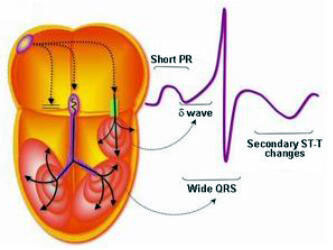
TCM Perspective On
Wolff Parkinson White SyndromeWolff-Parkinson-White (WPW) syndrome is a heart rhythm problem that causes a very fast heart rate. WPW is one type of supraventricular tachycardia called atrioventricular reciprocating tachycardia (AVRT).
With WPW, an extra electrical pathway links the upper chambers (atria) and lower chambers (ventricles) of the heart. In normal hearts, the only electrical connection between the atria and ventricles is through the AV node. The AV node helps control the heart beat. In WPW, the extra electrical pathway is called a bypass tract because it bypasses the AV node. So the AV node cannot control the heart beat, and so it beats very fast.
People with WPW can have a heart rate of 160 to 220 beats per minute. Also, they are more likely to have atrial fibrillation or atrial flutter. When they do, the electrical impulses can travel down the bypass tract and cause the heart to beat at rates of more than 250 to 300 times per minute. This may result in fainting (syncope) or cause sudden death. According to the symptoms and manifestations, Wolff Parkinson White Syndrome belongs to the category of "cardiac neurosis" or "palpitation". It's a kind of rare arrhythmia.